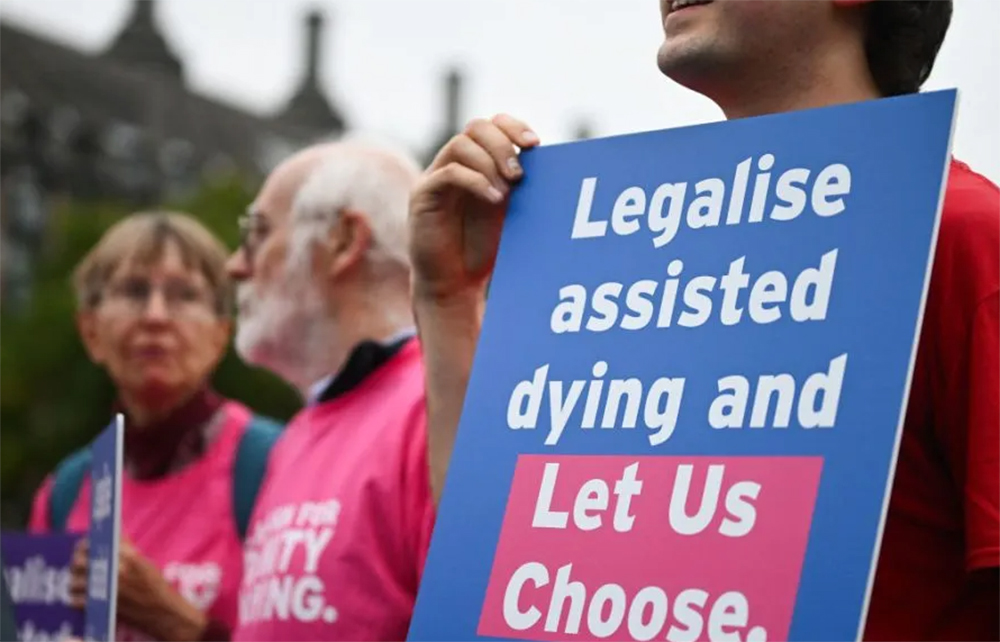Those in favour of the Terminally Ill Adults (End of Life) Bill insist they’ve addressed critics’ principal concerns and that ‘stringent safeguards’ are in place. But it is impossible to see how this could be the case. If suicide is institutionalised as a form of medical treatment it is inevitable that vulnerable people will feel under pressure to opt for it, and inevitable that the bill will in time be amended and extended.
In Canada, denying assisted suicide to people who are not terminally ill has been ruled to be discrimination
Under the terms of the existing bill, a terminally ill person given less than six months to live will legally be able to take their own life if sanctioned by two independent doctors and a High Court judge. Doctors are not under any duty to raise assisted suicide – or ‘assisted dying’ as its advocates prefer to call it – with a patient, but the bill does allow for them to ‘discuss the matter with a person’ when it is in line with their professional judgment. The bill promises that those opting for assisted suicide would have to make two separate declarations, at different times, of a desire to die, and that the decision would have to be confirmed by a judge.
The involvement of the courts might sound reassuring, but we know from the scandal of the single justice procedure – under which thousands of people have been prosecuted for TV licence evasion without their knowledge – how easily a judicial decision becomes in practice a rubber-stamping procedure.
The experience of Canada and the Netherlands, which have (among others) already legalised assisted suicide, indicates how the practice would develop in Britain if this bill passes. In Canada, assisted suicide was introduced on the understanding that it should only be available to terminally ill people whose death was ‘reasonably foreseeable’. Then the Superior Court of Quebec ruled that this discriminated against people who are not terminally ill and from 2027 assisted suicide will be available across Canada for those suffering from psychiatric illness. The fact that the judgment of these people is by definition impaired has done nothing to prevent the state offering to help them die.
Wherever it has been introduced, a law legalising assisted dying for the terminally ill has, in short order, evolved into routine euthanasia. In the Netherlands, assisted suicide has been tolerated since 1985, and became formally legalised in 2002. By 2019, it accounted for 4 per cent of deaths and was carried out in many cases by family doctors. In 2018 a physically healthy 29-year-old woman, Aurelia Brouwers, was granted the right to kill herself with a doctor’s help on the grounds that she suffered from a personality disorder and had had suicidal feelings. Rather than treat her for those feelings, the Dutch state chose to help her act on them.
In Belgium, too, euthanasia was legalised in 2002. By 2014 the country had amended the law to allow children to choose to be killed. Within three years, a nine-year-old and an 11-year-old became the first young children to have their lives ended with state approval. Between 2002 and 2021, 370 people suffering from mental illness were approved for assisted suicide in Belgium.
Critics of assisted suicide have consistently warned about a slippery slope and it has proven to be just that. Anyone who votes for Kim Leadbeater’s bill should do so in the knowledge that it is almost certain Britain would end up following the same route, and that the killing of children and the mentally ill would eventually be sanctioned by the state. If our domestic courts did not see to it, the European Court of Human Rights would. As in Canada, to deny assisted suicide to people who are not terminally ill would be ruled to be discrimination.
There has been an attempt in Leadbeater’s bill to guard against people being pressured into dying and a proposal to introduce a criminal offence, punishable with up to 14 years in prison, for anyone who persuaded someone to agree to assisted suicide. But pressure can be put on a person to agree to die without it being explicit. It could come from what family, doctors or nurses fail to say, just as much as what they suggest. Every mention of an ‘overloaded NHS’ or ‘bed-blockers’ can become a subliminal message to patients that they really ought to consider relieving society of the burden of keeping them alive.
In one sense the debate over assisted suicide has been refreshing. For once MPs are having to make up their own minds, with no whips to tell them how to vote. The issue has cut across party lines, with the cabinet heavily divided. For our legislators, it is a case of having to listen carefully to both sides and assess the evidence. But the evidence is clear.
No legal jurisdiction, of course, will ever succeed in eliminating unassisted suicide. The days when it was treated as a criminal offence are thankfully over. But when a state starts to sanction suicide by providing assistance, it leads to a devaluation of human life to the detriment of us all.







Comments